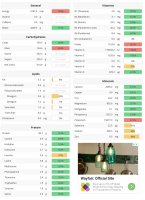O
oldfriend
Guest
I'm thinking of trying something like this. I used to eat practically fruitarian, which fixed my gut up good. Protein was definitely lacking though and eventually ran into fatigue. Taking a classic peat approach had some initial gains (again, suspect protein), but stubbornly adhered to it after plateauing and creating new problems. IDK why I was convinced that foods I've never tolerated were somehow good in spite of that. Anyways, @Waremu what does a typical day look like for you? And do you not attribute the high calcium on your crono screen shot mostly to molasses?At the moment, I am currently doing a dairy-free diet experiment. So my protein is coming from fruit, potatoes, and sometimes white rice and some gelatin here and there. Basically fruit and tubers (and some greens to get the calcium I need). But even without the gelatin I am easily getting 80 grams or so of protein. Oranges and potatoes have more protein than is stated on the nutrition facts label too, due to the keto acids, so my real protein intake is probably even higher than that.


